Hippos recognise their friends' voices!
- Published
- comments

Scientists studied groups of hippos living in a nature reserve in Mozambique
Did you know that just like you and me - hippos can communicate with their friends.
New research says they can recognise each other's voices - and can even pick them out when they hear them calling from far distances!
And let's face it - hippos are noisy animals! So their calls are pretty loud and can be heard as far as 1km away, according to the study in Current Biology.
But until now, the precise function of the loud "wheeze honks" the animals make has been a bit of a mystery.
"Wheeze honk"
Maybe these two hippos are having a chat?
Experts studying hippos at a nature reserve in Africa say the different way they honk allows them to identify friends and enemies - and they say the animals can probably recognise individuals from their 'voices'.
Professor Nicolas Mathevon, from the University of Saint-Etienne, in France led in the project and he has studied the sounds animals make right across the world, from leopard seals to hyenas.
He said hippos have a wide range of, erm, mouth noises - grunts, bellows, squeals and honks - but very little is known about how they actually communicate with each other.
Did someone just shout "wakey, wakey"?
"In their call, there is information about the identity of the individual - so they have 'voices' - and they are able to recognise each other by their voices," he said.
They found hippos could tell apart friends, neighbours and strangers from their voices.
'Helping conservation'
To find out more about hippo communication, scientists recorded the sounds of hippos living in the Maputo Special Reserve in Mozambique.
The biologists recorded the wheeze-honks of hippos and broadcast these from the shore of lakes to see how other individuals responded.
The area has a number of lakes with different hippo populations
Despite appearing to be lounging around on the water, the large mammals were clearly paying close attention to their surroundings and responded immediately to the broadcasts.
In addition to telling apart friend from foe (or, at least, unfamiliar hippos), the animals can probably distinguish between individuals, according to the researchers - though they can't be absolutely certain of this.
Prof Mathevon said it was important to learn more about the biology and behaviour of hippos to help avoid human-animal conflicts.
The knowledge might also assist with conservation, he said, as wild hippos are sometimes moved from one location to another to keep local populations healthy.
The work may inspire conservationists to make recordings to allow local hippos to get used to the voice of the new ones before they arrive, he added.
- Published16 February 2019
- Published16 June 2015
- Published22 December 2017
